KY abortion amendment campaigns use messages of ‘freedom’ and ‘spirit war’ to sway voters
On a recent Saturday afternoon, on the steps of the Kentucky Capitol, Bishop John Iffert wanted to make something clear: Christians have a duty to publicly advocate on behalf of unborn fetuses ahead of the November election.
“This is the one opportunity in our lifetime for the citizens of Kentucky to register your opinion on abortion and on life,” he told the few hundred people gathered for the Yes For Life rally in early October. They rallied in support of Constitutional Amendment 2 — a yes or no question on the November 8 ballot that seeks to change the wording of Kentucky’s constitution to clearly state there’s no protected right to, or state funding of, abortion.
Bishop Iffert, of the Diocese of Covington, walked rally goers step by step how to access sample ballots on their phones. He then directed them to return home to their respective churches and encourage their church leaders to preach a “yes” vote to their congregations. He asked congregants, does your church have a screen in its sanctuary where worship songs are projected? If so, “Project your sample ballot,” Iffert said. “Show them how to vote.”
He warned against naysayers.
“Some of you who are Catholic out there, you might run into a priest or a pastor who says, ‘The bishop tells me I can’t do any political activity,’” said Iffert. “But on this issue, on Amendment 2, this is not partisan political activity. This is issue advocacy.”
Iffert’s clarification of what churches are legally allowed to do under their federal tax-exempt status rules was met with a standing ovation. The Internal Revenue Services prohibits churches and charities designated as 501(c)(3) organizations from participating in candidate political campaigns. But political campaigning for a non-candidate issue, like a constitutional amendment, is allowed.
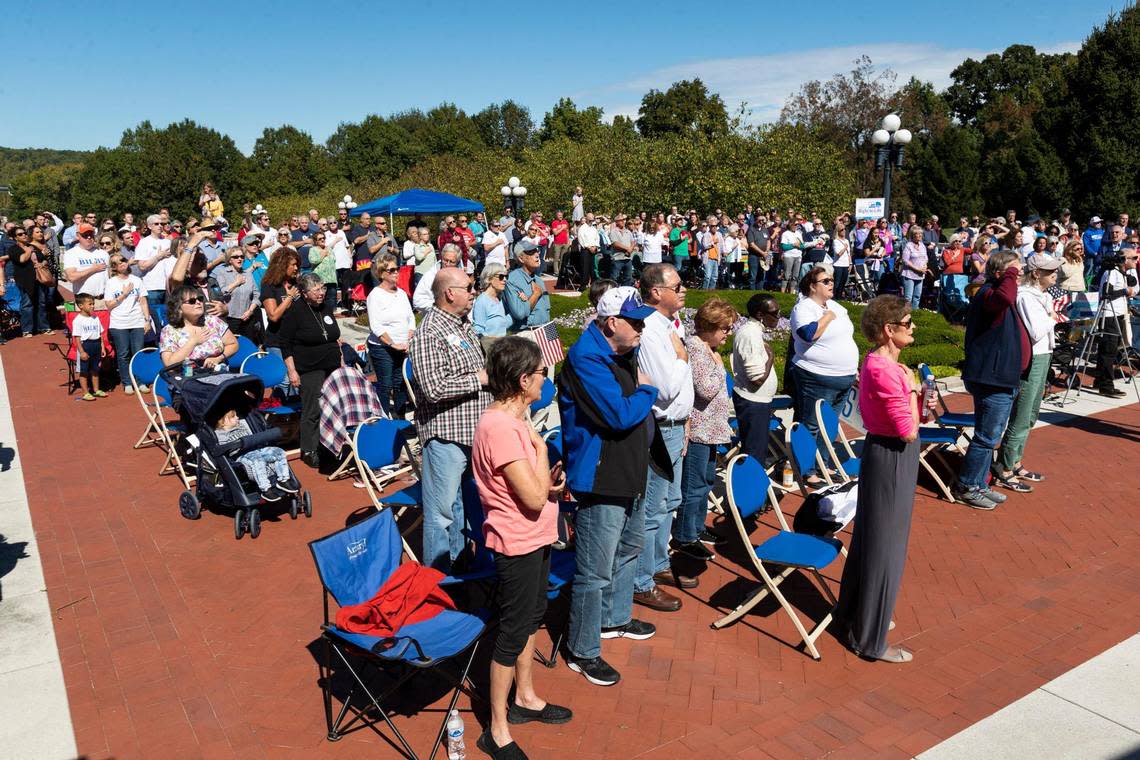
“This is standing for the truth (and) witnessing for the gospel. On this issue, you can do those things in your churches and in your parishes,” he said.
This allowance has opened the door for Yes For Life to lean on faith leaders across Kentucky — a devoutly religious state, with 76% of residents identifying as evangelical Christian — to wade into the political fray this election cycle and preach politics from the pulpit.
And in such a hyper-religious state, where local priests and pastors are often as influential as local elected leaders, Yes For Life has not only tailored its message to resonate with evangelicals (vote “yes” to “protect the unborn” and to preserve the “sanctity of life”) but the campaign’s voter outreach relies heavily on the proselytizing of Christian leaders.
One week after the call to arms from Bishop Iffert, on October 9, Minister Terry Cooper issued a dire warning to his Lawrenceburg congregation.
He was preaching from the book of Jeremiah, when the Old Testament God told Jeremiah to stop praying for the people of Judah, because their sexual and idolatrous transgressions were too far gone for redemption. God was poised to destroy their city as punishment, instead.
“Can America be compared to ancient Israel?” Cooper asked the congregants filling church pews at Ninevah Christian Church.
Cooper said America’s own irredeemable sins have come in the form of the “godless LBGT agenda,” materialism, and abortion rights. It’s a “spirit war,” he said.
“The blood of nearly 60 million aborted babies cries out to God,” Cooper nearly shouted. “Child sacrifices now come in pill form. The nation has now abandoned God.”
He commanded his followers to surrender to God or face death, because it’s too late to waste time praying for the nation. “If you don’t surrender to him, then you have become (God’s) enemy. And he will come to destroy you at some point. Deny or ignore today’s warnings, and you will die.”
To shouts of “amen” and applause from his church, Cooper vowed, “I’m not quitting, not giving up. I’m going to vote in November, and I’m going to openly campaign for the Kentucky constitutional amendment that would outlaw child sacrifice in this state.”
Church leaders in Kentucky like Cooper have heeded Bishop Iffert’s call and spread the “vote yes” message far and wide this election cycle. Many have devoted Sunday morning services to Amendment 2, like Ninevah Church; others have slipped “vote yes on 2” memos in church bulletins, like Cathedral of Christ the King in Lexington; Catholic bishops from diocese across Kentucky have penned open letters calling for “yes” votes; and evangelical heavy-hitters have publicized endorsement about why voting yes is the Christian way, including Southern Baptist Theological Seminary President Dr. Albert Mohler and Boyce Bible College professor and pastor Denny Burk.
Since abortion “is an inherently religious issue” for many Kentuckians, the Yes For Life campaign has focused solely on shoring up its broad base of support, said Dr. Ryan Salzman, associate political science professor at Northern Kentucky University.
In theory, Salzman said, “If your base turns out, then you win,” adding that “keying in on religious and church congregations is a sure fire way to do that.”
But at a time when public perception of abortion access is shifting, speaking solely to that traditional base might not be enough.
Early messaging from Protect Kentucky Access, the counter campaign vying to defeat Amendment 2, has tried to capitalize on this shift and appeal to both secular voters and churchgoers.
“Most people believe abortion should be safe and legal, and that the government should not be involved in our personal, private medical decisions,” said PKA campaign manager Rachel Sweet in a late August interview on WVLK. “For all believers — and for most people, whether they’re a churchgoer or not — I don’t think this is a black and white issue.”
The overturn of Roe v. Wade, Sweet added, meant “there is really nothing standing between citizens and total government overreach when it comes to their reproductive health and rights.”
Campaign messaging diverges
Though Protect Kentucky Access, like Yes For Life, has mostly focused on coaxing sympathetic voters to ballot boxes, their message of limited government interference resonates across the religious spectrum.
In late September, Shawna McCown, 40, holding a “Your freedom, your vote” pamphlet, climbed the steps of a stately house a few blocks from downtown Ashland and knocked on the door.
A dog barked. Its owner, a woman in her 70s, hung up her phone call and walked out hesitantly.
“Hi, I’m Shawna with Protect Kentucky Access,” said McCown quickly. It was her first time door-to-door canvassing, and she was nervous to discuss a controversial subject. “We’re the coalition fighting to defeat Amendment 2 on the ballot in November. Do you have a second to talk with me?”
The woman, who was a registered Republican, acquiesced, and McCown launched into her script: when the U.S. Supreme Court dropped federal protections for abortion access in late June, states were handed the reins on abortion care. Kentucky’s trigger law immediately banned nearly all abortions. Today, a legal abortion can only be provided in Kentucky if the life of the pregnant person is at risk.
Amendment 2, if passed, would would make it much harder to legally challenge those laws, barring courts from interpreting a right to abortion within the constitution. The same General Assembly that has banned abortion would become the primary arbiters of those laws.
“We want you to vote no,” McCown told the woman. “We don’t want the constitution changed.”
The woman nodded. “I don’t want it changed, either.”
Both campaigns have painted binary realities. In addition to messages from church leaders, Yes For Life’s campaign has focused solely on elective abortion, contributing to the spread of misinformation by falsely stating in its television ad that opponents of Amendment 2 “want to spend YOUR tax dollars on late-term abortions, even up to the moment of birth.”
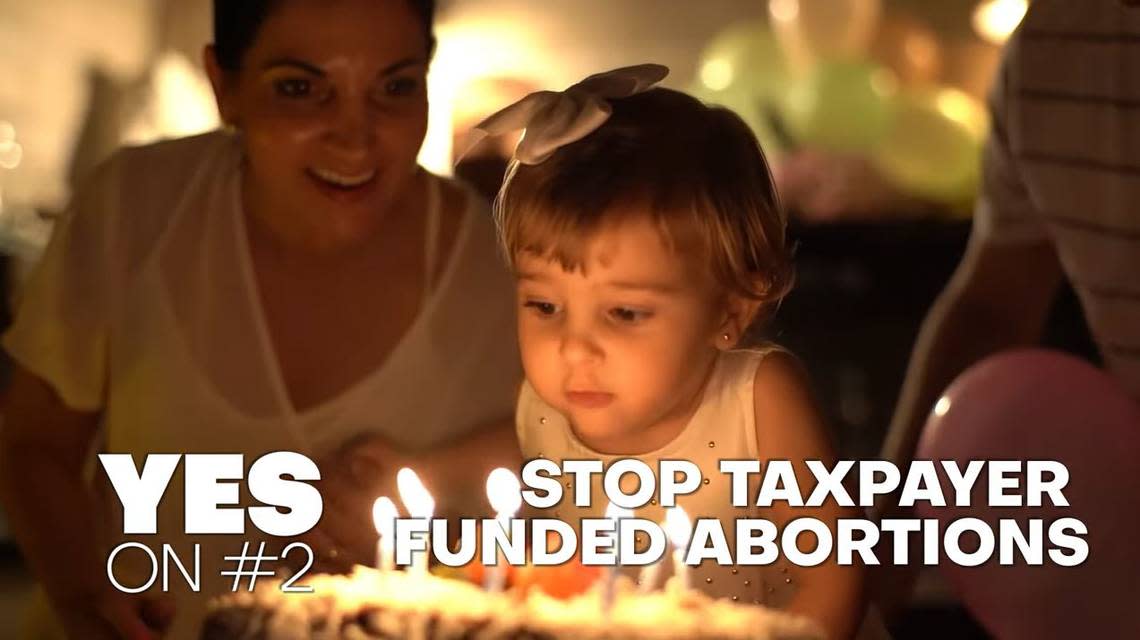
Taxpayer-funded abortions are already illegal under state and federal law, and abortion “up to the moment of birth,” is a fallacy. Elective abortions beyond the point of viability have long been illegal in Kentucky. Any abortive procedure considered “late-term” is done for a medically-necessary reason, as the Herald-Leader has reported.
Meanwhile, Protect Kentucky Access’s centralized message focuses on the ban’s lack of exceptions for rape or incest, and what the proposed amendment potentially paves the way for in the future. PKA has also bent the truth by conflating the amendment with the trigger law.
In PKA’s second television ad, a woman recounts her daughter’s healthy pregnancy that resulted in a granddaughter.
While her daughter’s pregnancy was healthy, “If Amendment 2 passes, my granddaughter may not have the option to end a pregnancy to stay alive, and that’s unimaginable,” said the woman, calling the amendment “an extreme mandate made by politicians.”
While the constitutional amendment removes judicial oversight, it’s not a mandate, as she says. And though Kentucky’s current law includes medical exceptions in order to save the life of a pregnant person, much of PKA’s messaging is speculative about what a change to the constitution could pave the way for.
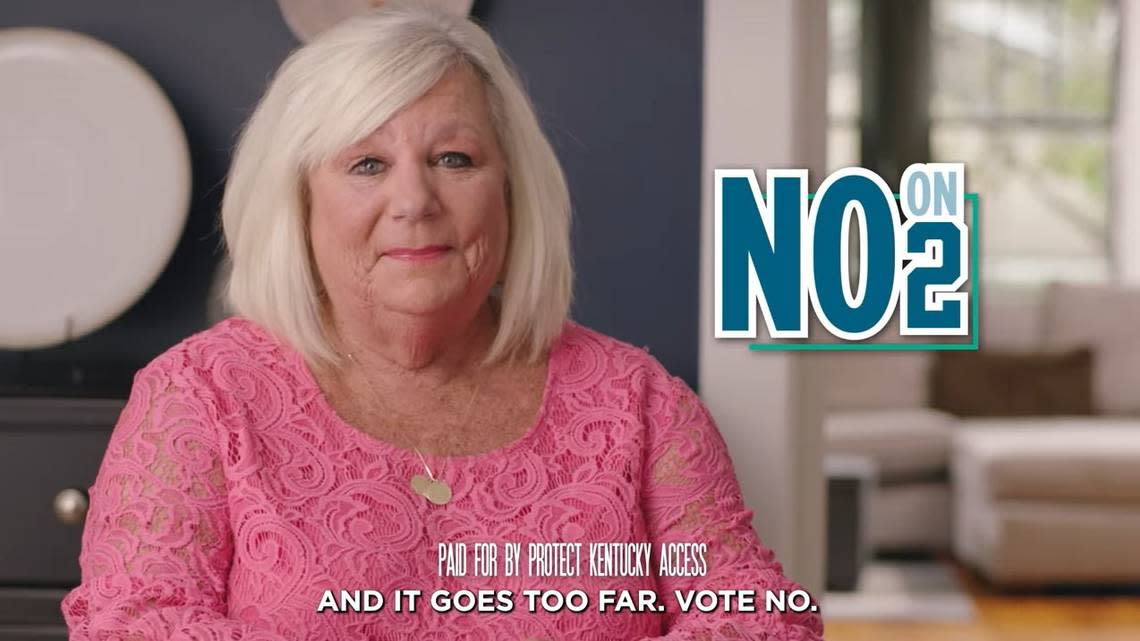
If lawmakers were to one day remove the medical exception in the state’s trigger law — though there’s no real indication this is a threat — the passage of Amendment 2 would largely remove any legal recourse to challenge that or any other aspect of Kentucky’s abortion laws, no matter how sweeping.
‘You can’t just ban it all’
For McCown, and many of the people she talked to in Ashland that day, abortion access is not a black and white issue.
McCown signed up to canvas because she sees the trigger law’s direct impact on young people, and she fears a future where there’s no real avenue to challenge those laws.
“I work at a place with juvenile public and status offenders, so a lot of my boys and girls have been victims of sex crimes or human trafficking,” she said, pausing on the sidewalk in front of her next house. “I know the awful things adults are willing to do to vulnerable people, and it’s ridiculous to say that you don’t have control over what happens to your body,” she added, referencing the trigger law’s lack of exceptions for sexual violence or incest, even if the victim is a child or a teenager.
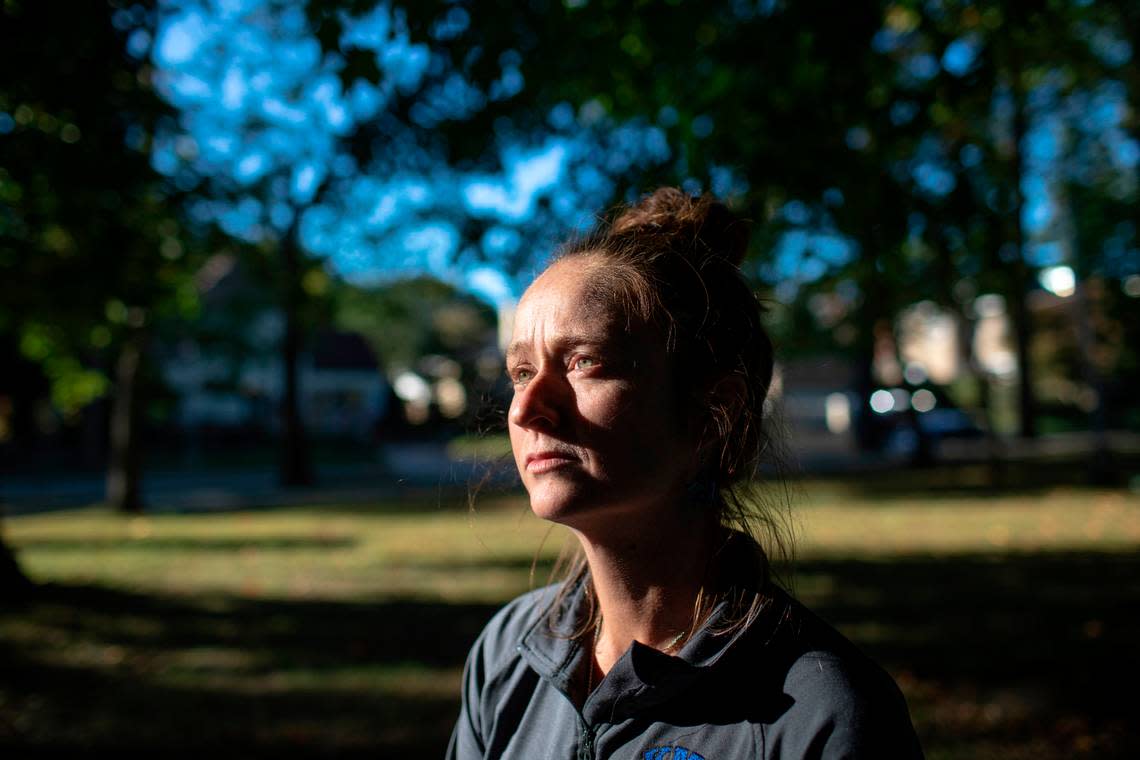
“I have to sit there and listen to their stories day in and day out, and you all are telling me that these little kids just have to take it?” she said.
McCown dug into the very complex, and very personal, circumstances where an abortion may be necessary as she went door to door, sharing a nuanced message with residents who did not personally support abortion.
That included a trio of men working on a van in their driveway.
“Y’all registered to vote?” McCown asked them.
While two were not registered, a third was able to vote, so McCown again gave them her pitch on the trigger law and the solidification of the abortion ban through Amendment 2.
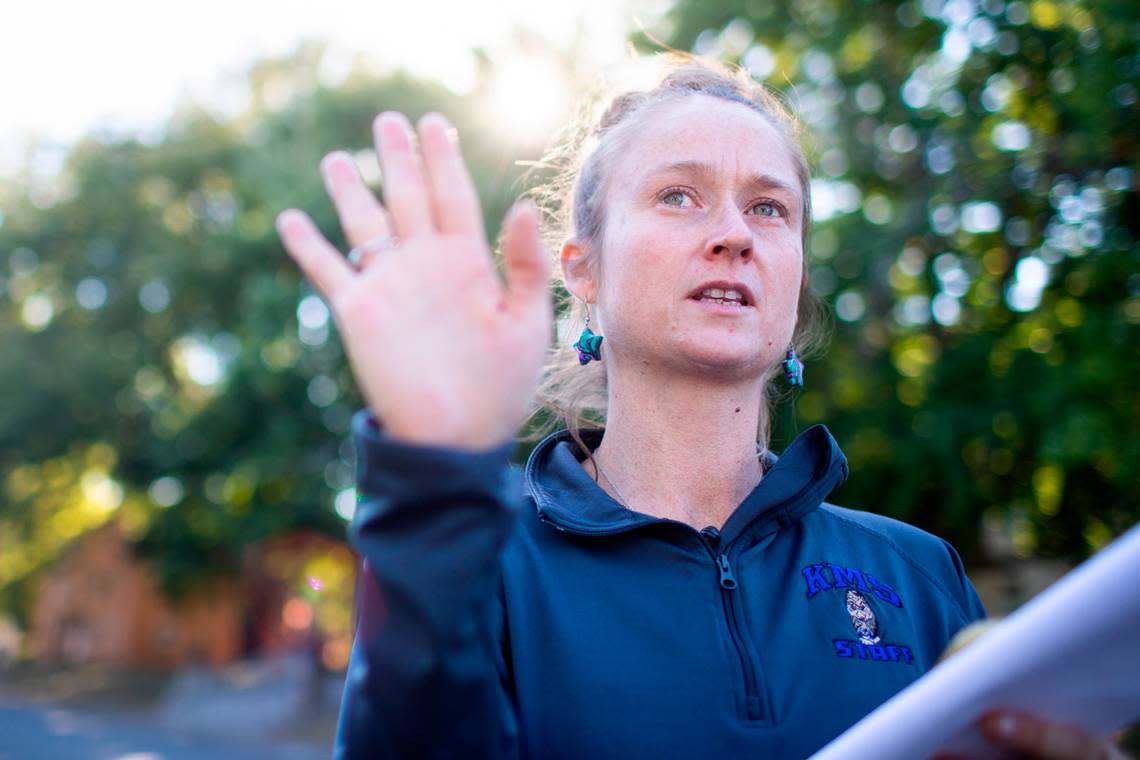
“I’m not for abortion, but that stuff is an over generalization,” said the third one, shaking his head and agreeing with McCown. “You can’t just ban it all. If you’re that way, you’ve never had a hard life.”
“So maybe spread the word?” she asked. They nodded, and she continued on to the next house.
